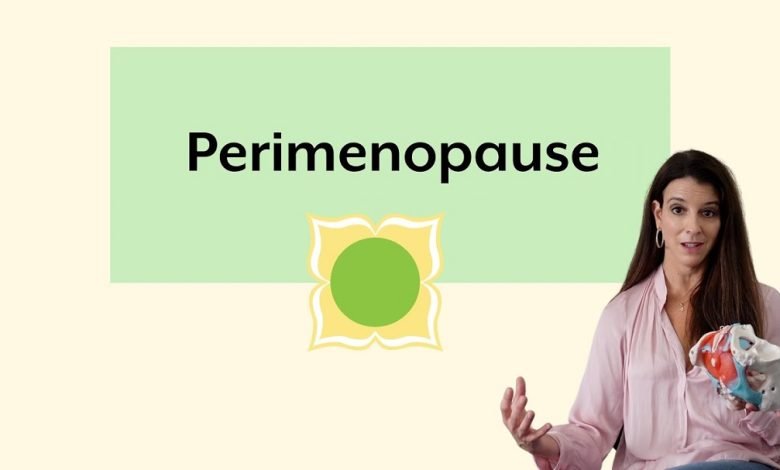What Is the Procedure of Perimenopause and How Does It Affect You?

Perimenopause is the time between menopause and the onset of menopause. Estrogen, a vital female hormone, begins to decline during perimenopause. Menopause-like symptoms, such as hot flashes or irregular periods, may appear. Perimenopause can linger for months or even years. Menopause begins when you go a year without having a period.
What exactly means perimenopause?
When your body begins to transition to menopause (also known as the menopausal transition), you are in perimenopause. Your ovaries start generating less hormones around this time, leading your menstrual cycle to become inconsistent or irregular. Your body is approaching the end of its reproductive years at this point.
Perimenopause can start in your mid-30s and last until your mid-50s. Some women only go through perimenopause for a few months. However, for many people, it lasts between four and eight years. The word perimenopause simply refers to the point in your life when your menstrual periods become unpredictable.
As your body adjusts to varied hormone levels, other physical changes and symptoms may develop. You can still get pregnant during perimenopause, even though your fertility is falling. Perimenopause symptoms, as well as the age at which it begins and the length of time it lasts, differ from woman to woman. After 12 months without a monthly cycle, you are no longer in perimenopause and have entered menopause.
What is the distinction between perimenopause and menopause?
Perimenopause is a period of transition between menopause and menopause. Menopause is the term utilized to depict the conclusion of a woman’s menstrual cycle.Menopause is defined as the absence of a menstrual cycle for a period of 12 months.
What causes perimenopause?
As you become older, your ovaries generate less estrogen in preparation for you to cease producing eggs totally. Finally, your body is preparing for menopause, when you will no longer be able to conceive. It’s a completely natural and typical part of a woman’s reproductive cycle.
When does perimenopause start?
About eight to ten years before menopause, perimenopause begins. It normally begins in your mid-forties, although it may begin sooner. Premature menopause refers to the onset of menopause before the age of 40. Early menopause can be caused by certain medical disorders or surgeries. When there is no medicinal or surgical basis for early menopause, essential ovarian deficiency occurs.
Perimenopause lasts for how long?
Perimenopause lasts around four years on average. This period might last only a few months for some people. Others, on the other hand, will spend more than four years in this phase of change. You are no longer in perimenopause if you have been without a period for more than 12 months.
What happens to your hormones during perimenopause?
The decline in estrogen levels during perimenopause is the primary source of hormonal alterations. Estrogen is produced by your ovaries and is essential for the reproductive system to function properly. Your estrogen levels start to drop as you reach perimenopause.
As estrogen levels drop, progesterone, another hormone produced by the ovaries, becomes unbalanced. Ovulation and menstruation are controlled by these two hormones. Hormone levels commonly vary during perimenopause, rising and falling like a rollercoaster.
Your ovaries stop producing eggs when you approach menopause because your body produces so little estrogen. You will no longer have your period at this point.
What are the initial perimenopause symptoms?
In most cases, irregular periods are the initial indicator of perimenopause. Most women’s menstrual periods will go from somewhat regular to unexpected. The most frequent indicators of menopause, such as hot flashes and vaginal dryness (vaginal atrophy), strike many women early in the menopausal transition.
What are some of the signs and symptoms of perimenopause?
Since the age of puberty, your body has produced estrogen. Your body must acclimatize to the changes in hormones as estrogen levels begin to fall.
The signs and symptoms vary, however the majority of people will suffer at least one of the following:
- Periods that are irregular or skipped.
- Periods that are more or less intense than normal.
- flashes of heat (a sudden feeling of warmth that spreads across your body).
- Dryness and pain in the vaginal area during intercourse.
- Urinary urgency is a term that refers to the urgency with (needing to urinate more frequently).
- Sleep issues (insomnia).
- Irritability, despair, or mood swings are examples of changes in mood.
Perimenopausal symptoms might last anywhere from a few months to several years. Estrogen deficiency can cause bone weakening and cholesterol levels to fluctuate. Continue to see your doctor on a regular basis to monitor your health.
How do perimenopausal periods feel like?
Your body produces less hormones that aid ovulation, causing irregular periods. It’s possible that your menstrual period could lengthen or shorten. It’s also possible that your bleeding is different than usual. Premenstrual syndrome (PMS) symptoms may also vary for some persons.
How can I determine if my menstrual fluctuations are normal perimenopausal symptoms or cause for concern?
During perimenopause, irregular periods are frequent and normal, although other disorders might cause abnormal menstrual flow. If any of the following scenarios apply to you, visit a doctor to rule out other possibilities.
- Your periods have grown extremely heavy or are accompanied by blood clots.
- Your periods are a few days longer than they usually are.
- After your period, you may spot or bleed.
- After intercourse, you have spotting.
- Your menstrual cycles are getting closer together.
Premenopausal hormone imbalances, infection, pregnancy-related bleeding, fibroids, blood-clotting issues, endometrial polyps, miscarriage, using blood thinners, or cancer are all possible reasons of irregular bleeding.
Do you ovulate once you’ve reached perimenopause?
You’re still ovulating if you’re still having a period, even if it’s irregular. Until you haven’t had a period for 12 months in a row. You should take it as a given that your body is still ovulating.
Perimenopause is diagnosed in what way?
When it comes to a perimenopause diagnosis, you don’t necessarily need to see a doctor. Without a formal diagnosis, many individuals detect and accept physical changes. Consult a healthcare practitioner if your symptoms are interfering with your regular routine.
- If you have blood clots in menstrual discharge, you should contact your healthcare practitioner straight soon.
- Between periods, some spotting is done.
- After intercourse, there’s a lot of vaginal bleeding.
- Your capacity to operate on a daily basis is being harmed by emotional problems.
Perimenopause is defined by a high FSH level.
The pituitary gland, which is located near the base of your brain, produces the hormone FSH (follicle stimulating hormone). It encourages ovulation by causing the ovaries to release an egg. Menopause can be confirmed by determining your FSH level. Menopause can be indicated by a persistently high FSH level. FSH testing, on the other hand, might be deceiving since hormones fluctuate a lot during perimenopause. Certain drugs, such as birth control pills or hormone treatment, can cause hormone levels to fluctuate, affecting the findings of hormone testing. High prolactin levels and an overactive thyroid might potentially affect the outcome.





